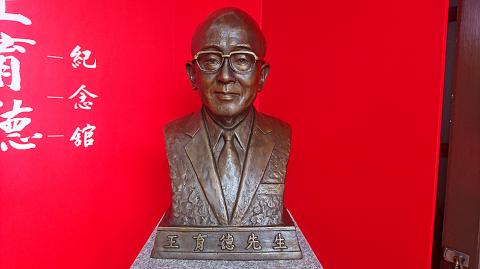A museum dedicated to independence activist Ong Iok-tek (王育德) yesterday opened at his former residence in Tainan, where he lived with his elder brother Ong Iok-lim (王育霖).
Born in 1924, Ong Iok-tek was a spiritual leader and forerunner of the Taiwanese independence movement in Japan. He was also an expert on the Hoklo language (commonly known as Taiwanese).
Ong Iok-lim, who was born in 1919, was the first Taiwanese prosecutor in the Japanese Empire.

Photo: Liu Wan-chun, Taipei Times
After World War II, he returned to Taiwan and served as a prosecutor in Hsinchu City, but resigned after investigating then-Hsinchu mayor Kuo Shao-tsung (郭紹宗) for corruption.
Ong Iok-lim was killed during the 228 Incident in 1947.
In 1949, Ong Iok-tek fled to Japan through Hong Kong with only one suitcase in hand.
In 1960, while in Japan, he founded the Taiwan Youth Society, a political group that published a magazine titled Taiwan Youth (台灣青年).
In 1969, he received a doctorate from the University of Tokyo for his studies on Hoklo, becoming the first person to do so.
In 1974, he began campaigning for the rights of Taiwanese who had served in the Japanese military during the Japanese colonial era, but died of a heart attack in 1985, at the age of 61, before he could see the result of his efforts.
In 1986, the Japanese government passed a resolution to pay ¥2 million (US$18,017 at the current exchange rate) to each of the families of the Taiwanese soldiers who were killed in combat or to survivors who had been severely injured.
In 2002, Avanguard Publishing House published the complete works of Ong Iok-tek in Chinese.
Originally written in Japanese, Taiwan: A History of Agonies (台灣 — 苦悶的歷史), which has also been translated into English, is one of Ong Iok-tek’s most important works and is made up of 15 volumes.
Ong Iok-tek’s 93-year-old wife, Wang Mei-hsueh (王雪梅), daughter Wang Ming-lee (王明理) and granddaughter Aya Kondo, as well as other family members, traveled from Japan to attend yesterday’s plaque hanging and opening ceremony at the museum.
Several Japanese reporters were also present.
Many of Ong Iok-tek’s personal belongings are exhibited at the museum, including the suitcase he carried when he fled Taiwan, his report cards from school, photographs, manuscripts and clothing.

The first global hotel Keys Selection by the Michelin Guide includes four hotels in Taiwan, Michelin announced yesterday. All four received the “Michelin One Key,” indicating guests are to experience a “very special stay” at any of the locations as the establishments are “a true gem with personality. Service always goes the extra mile, and the hotel provides much more than others in its price range.” Of the four hotels, three are located in Taipei and one in Taichung. In Taipei, the One Key accolades were awarded to the Capella Taipei, Kimpton Da An Taipei and Mandarin Oriental Taipei. Capella Taipei was described by

EVA Airways today confirmed the death of a flight attendant on Saturday upon their return to Taiwan and said an internal investigation has been launched, as criticism mounted over a social media post accusing the airline of failing to offer sufficient employee protections. According to the post, the flight attendant complained of feeling sick on board a flight, but was unable to take sick leave or access medical care. The crew member allegedly did not receive assistance from the chief purser, who failed to heed their requests for medical attention or call an ambulance once the flight landed, the post said. As sick

The Taichung District Court yesterday confirmed its final ruling that the marriage between teenage heir Lai (賴) and a man surnamed Hsia (夏) was legally invalid, preventing Hsia from inheriting Lai’s NT$500 million (US$16.37 million) estate. The court confirmed that Hsia chose not to appeal the civil judgement after the court handed down its ruling in June, making the decision final. In the June ruling, the court said that Lai, 18, and Hsia, 26, showed “no mutual admiration before the marriage” and that their interactions were “distant and unfamiliar.” The judge concluded that the couple lacked the “true intention of

INDUSTRY: Beijing’s latest export measures go beyond targeting the US and would likely affect any country that uses Chinese rare earths or related tech, an academic said Taiwanese industries could face significant disruption from China’s newly tightened export controls on rare earth elements, as much of Taiwan’s supply indirectly depends on Chinese materials processed in Japan, a local expert said yesterday. Kristy Hsu (徐遵慈), director of the Taiwan ASEAN Studies Center at the Chung-Hua Institution for Economic Research, said that China’s latest export measures go far beyond targeting the US and would likely affect any country that uses Chinese rare earths or related technologies. With Japan and Southeast Asian countries among those expected to be hit, Taiwan could feel the impact through its reliance on Japanese-made semi-finished products and